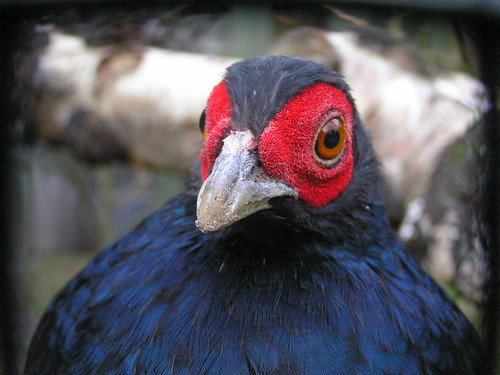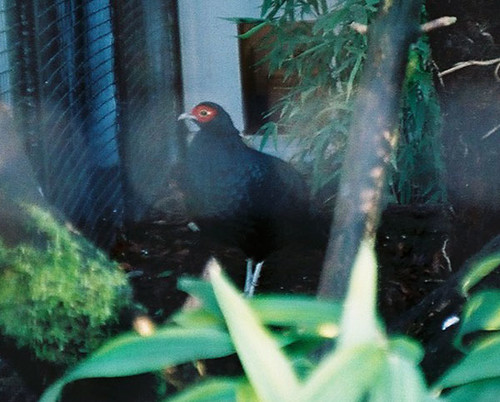Burung ini masuk dalam daftar merah burung langkah, menurut laporan oleh ahli burung dunia di bird forum pada tahun 2003, burung ini masih dapat di temukan di Gunung Kaba dan Gunung Kerinci, di mana kedua gunung ini berada di antara Taman Nasional Kerinci Seblat. Setelah laporan tahun 2003 itu, admin tidak ada menemukan lagi laporan apakah burung ini masih ada di Gunung Kaba? Peran serta masyarakat kab. Rejang Lebong tentu perlu untuk mengenalkan rupa burung ini, agar penemuannya kembali bisa di laporkan, atau salah satu kekayaan hayati di Gunung Kaba ini telah punah dari habitatnya?
Sekilas rupanya dari jauh seperti ayam karena memang masuk keluarga ayam-ayaman, tapi dari dekat si jantan bulunya sangat indah, biru mengkilat kena cahaya, dan akan berwarna kehitaman di tempat teduh, sedang betina berwarna coklat,dan warna merah sekitar mata adalah ciri khas keindahannya. Yuk sama-sama lestarikan satwa khas ini.
Photo-photo berikut adalah koleksi dari Kebun Binatang di Belgia dan Inggriss, sementara kebun binatang kita sendiri tidak punya koleksinya, miris sekali memang.
Sekilas rupanya dari jauh seperti ayam karena memang masuk keluarga ayam-ayaman, tapi dari dekat si jantan bulunya sangat indah, biru mengkilat kena cahaya, dan akan berwarna kehitaman di tempat teduh, sedang betina berwarna coklat,dan warna merah sekitar mata adalah ciri khas keindahannya. Yuk sama-sama lestarikan satwa khas ini.
Photo-photo berikut adalah koleksi dari Kebun Binatang di Belgia dan Inggriss, sementara kebun binatang kita sendiri tidak punya koleksinya, miris sekali memang.
Salvadori's Pheasant (Lophura inornata)
Sumatran Pheasant; hoogerwerfi - Atejh Pheasant, Aceh Pheasant
Sumatran Pheasant; hoogerwerfi - Atejh Pheasant, Aceh Pheasant
Justification This pheasant qualifies as Vulnerable. There are few records, indicating that it has a small population, which is declining and becoming increasingly fragmented owing to clearance of mid-altitude forests.
| Salvadori's Pheasant Lophura inornata - Male | |
 |
Range & Population Lophura inornata is endemic to Sumatra, Indonesia, where it is known from at least 10 localities in the central and south Barisan mountain range. There are recent records from at least two of these sites, Gunung Kaba and Gunung Kerinci, both within Kerinci-Seblat National Park. It was described as fairly common around Kerinci in the early 1900s
Status
Classified as Vulnerable (VU) on the IUCN Red List 2007 and 2008

Endemic sumatera





Salvadori's Pheasant (Lophura inornata) Photo by Myles Lamont
Family/Sub-family Phasianidae
Species name author (Salvadori, 1879)
Taxonomic source(s) Sibley and Monroe (1990, 1993)
Salvadori's Pheasant Lophura inornata
Salvadori's Pheasant Lophura inornata inornata - Female

Identification 46-55 cm. Short-tailed pheasant. Male uniform, dark bluish-black with some indistinct pale bluish fringing to upperparts, bare red facial skin and pale grey legs. Female rufous-brown with distinct paler shaft streaks and irregular blotching, particularly on underparts, dark tail and pale grey legs. Similar spp. Female Sumatran Pheasant L. hoogerwerfi is darker, lacks prominent pale shaft streaks and pale blotching, and has darker grey legs, but males may be indistinguishable. Female Crested Fireback L. ignita has crest, longer tail and white scaling on underparts. Female Crestless Fireback L. erythrophthalma lacks blue fringing to upperparts. Voice A series of clucking calls.
Taxonomy Sometimes considered conspecific with L. hoogerwerfi. The males are apparently morphologically indistinguishable, but females show distinct morphological differences.
Population estimate 2,500-10,000
Population trend decreasing (continuing
Range estimate 34000 km2
Country endemic? Yes
Salvadori's Pheasant Lophura inornata - Female


Ecology It is a resident of lower (and possibly upper) montane humid forest from c.800-2,200 m, most observations coming from above 1,000 m. It appears to prefer primary, unlogged forest, but also frequents disturbed and degraded habitats in close proximity to primary forest.
Threats In Kerinci-Seblat National Park, the species is declining due to heavy trapping by local people for food. Much of the forest within the lower part of the species's altitudinal range around Kerinci has already been cleared for shifting cultivation, and is vulnerable to further illegal agricultural encroachment and increasingly frequent drought fires.
Action The species is known to occur in at least one large protected area, the Kerinci-Seblat National Park, plus two other areas currently designated as protection forest, but proposed for upgrading to wildlife reserves, Gunung Singgalang and Bukit Dingin/Gunung Dempu.
berikut ini photo koleksi arkive, jantan warna biru, dan betina warna coklat :
http://www.arkive.org
http://www.birdforum.net/showthread.php?t=9776&highlight=kaba+mountain
http://www.flickr.com


















1 comments:
I like this pheasant!
thomasbirds.blogspot.com
Post a Comment